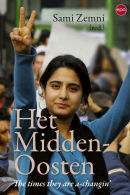(08-04-2013) Iraqi Minorities, A Spring Experience In Crisis
(25-09-2012) Iraqi Jews reject ‘cynical manipulation’ of their history by Israel, Zionists, writer Almog ...
(19-02-2013) Iraq Back at the Brink
(06-02-2013) Privileges of New Democratic Iraq: Rape & Torture of Innocent Women in Maliki’s Prisons
(23-12-2012) How many more innocent people will be sentenced to death for the bombing of the Foreign and Finance ...
The BRussells Tribunal is independent and wants to remain independent.
The BRussells Tribunal is an activist think tank and peace organisation with a special focus on Iraq. Read more...



 The times they are a-changin' is het eerste grondige Nederlandstalig overzicht dat voorbij oppervlakkigheden en algemeenheden wandelt, en ook nog eens de hele regio bestrijkt, van Egypte en Tunesië tot Marokko, Libië, Syrië, Libanon, Palestina, Jemen, Jordanië, Irak, Bahrein en Israël. Daar bestaat een woord voor: een standaardwerk.
The times they are a-changin' is het eerste grondige Nederlandstalig overzicht dat voorbij oppervlakkigheden en algemeenheden wandelt, en ook nog eens de hele regio bestrijkt, van Egypte en Tunesië tot Marokko, Libië, Syrië, Libanon, Palestina, Jemen, Jordanië, Irak, Bahrein en Israël. Daar bestaat een woord voor: een standaardwerk.